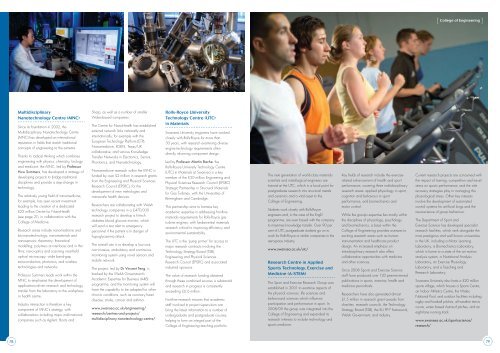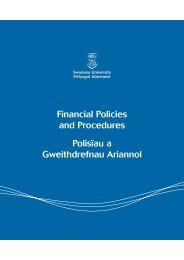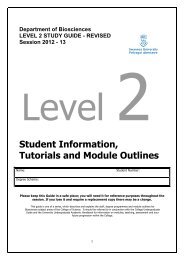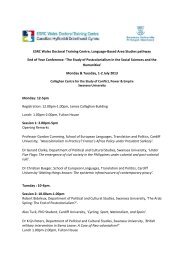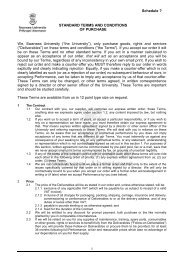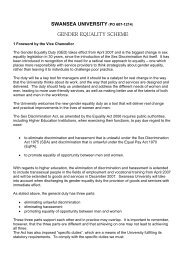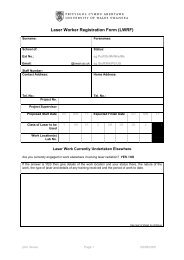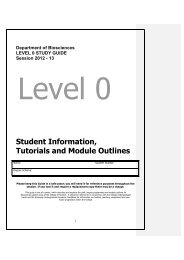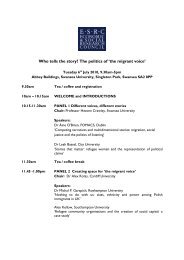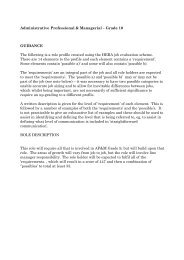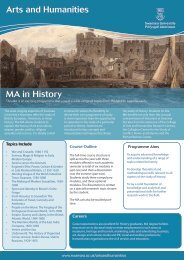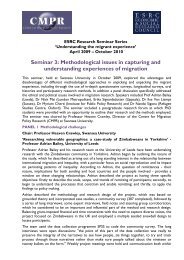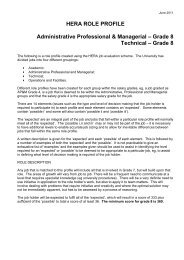College of Engineering - Swansea University
College of Engineering - Swansea University
College of Engineering - Swansea University
Create successful ePaper yourself
Turn your PDF publications into a flip-book with our unique Google optimized e-Paper software.
]<br />
<strong>College</strong> <strong>of</strong> <strong>Engineering</strong> ]<br />
Multidisciplinary<br />
Nanotechnology Centre (MNC)<br />
Since its foundation in 2002, the<br />
Multidisciplinary Nanotechnology Centre<br />
(MNC) has developed an international<br />
reputation in fields that stretch traditional<br />
concepts <strong>of</strong> engineering to the extreme.<br />
Thanks to radical thinking which combines<br />
engineering with physics, chemistry, biology<br />
and medicine, the MNC, led by Pr<strong>of</strong>essor<br />
Huw Summers, has developed a strategy <strong>of</strong><br />
developing projects to bridge traditional<br />
disciplines and provide a step-change in<br />
technology.<br />
The relatively young field <strong>of</strong> nanomedicine,<br />
for example, has seen recent investment<br />
leading to the creation <strong>of</strong> a dedicated<br />
£22 million Centre for NanoHealth<br />
(see page 21), in collaboration with the<br />
<strong>College</strong> <strong>of</strong> Medicine.<br />
Research areas include nanomedicine and<br />
bio-nanotechnology; nanomaterials and<br />
nanosensors; rheometry; theoretical<br />
modelling; polymers at interfaces and in thin<br />
films; nano-optics and scanning near-field<br />
optical microscopy; wide band-gap<br />
semiconductors; photonics; and wireless<br />
technologies and networks.<br />
Pr<strong>of</strong>essor Summers leads work within the<br />
MNC to emphasise the development <strong>of</strong><br />
applications-driven research and technology<br />
transfer from the laboratory to the workplace<br />
or health centre.<br />
Industry interaction is therefore a key<br />
component <strong>of</strong> MNC’s strategy, with<br />
collaborations including major multi-national<br />
companies such as Agilent, Boots and<br />
Sharp, as well as a number <strong>of</strong> smaller<br />
Wales-based companies.<br />
The Centre for NanoHealth has established<br />
external network links nationally and<br />
internationally, for example with the<br />
European Technology Platform (ETP),<br />
Nanomedicine, XGEN, Texas/UK<br />
collaborative, and various Knowledge<br />
Transfer Networks in Electronics, Senors,<br />
Phontonics, and Nanotechnology.<br />
Nanomedicine research within the MNC is<br />
funded by over £2 million in research grants<br />
from the <strong>Engineering</strong> and Physical Sciences<br />
Research Council (EPSRC), for the<br />
development <strong>of</strong> new metrologies and<br />
nanoscale health devices.<br />
Researchers are collaborating with Welsh<br />
technology companies in a £470,000<br />
research project to develop a hi-tech<br />
diabetes blood glucose monitor, which<br />
will send a text alert to emergency<br />
personnel if the patient is in danger <strong>of</strong><br />
hypoglycaemia attack.<br />
The overall aim is to develop a low-cost,<br />
non-invasive, ambulatory and continuous<br />
monitoring system using novel sensors and<br />
mobile network.<br />
The project, led by Dr Vincent Teng, is<br />
backed by the Welsh Government’s<br />
Academic Expertise for Business (A4B)<br />
programme, and the monitoring system will<br />
have the capability to be adapted for other<br />
chronic conditions, such as coronary heart<br />
disease, stroke, cancer and asthma.<br />
www.swansea.ac.uk/engineering/<br />
research/centres-and-projects/<br />
multidisciplinary-nanotechnology-centre/<br />
Rolls-Royce <strong>University</strong><br />
Technology Centre (UTC)<br />
in Materials<br />
<strong>Swansea</strong> <strong>University</strong> engineers have worked<br />
closely with Rolls-Royce for more than<br />
30 years, with research examining diverse<br />
engine technology requirements <strong>of</strong>ten<br />
directly informing component design.<br />
Led by Pr<strong>of</strong>essor Martin Bache, the<br />
Rolls-Royce <strong>University</strong> Technology Centre<br />
(UTC) in Materials at <strong>Swansea</strong> is a key<br />
member <strong>of</strong> the £50 million <strong>Engineering</strong> and<br />
Physical Sciences Research Council (EPSRC)<br />
Strategic Partnership in Structural Materials<br />
for Gas Turbines, with the Universities <strong>of</strong><br />
Birmingham and Cambridge.<br />
This partnership aims to harness key<br />
academic expertise in addressing frontline<br />
materials requirements for Rolls-Royce gas<br />
turbine engines, with fundamental materials<br />
research critical to improving efficiency and<br />
environmental sustainability.<br />
The UTC is the ‘pump primer’ for access to<br />
major research contracts involving the<br />
Technology Strategy Board (TSB),<br />
<strong>Engineering</strong> and Physical Sciences<br />
Research Council (EPSRC) and associated<br />
industrial sponsors.<br />
The value <strong>of</strong> research funding obtained<br />
through these combined sources is substantial<br />
and research in progress is consistently<br />
exceeding £6.6 million.<br />
Frontline research ensures that academic<br />
staff involved in project supervision can<br />
bring the latest information to a number <strong>of</strong><br />
undergraduate and postgraduate courses,<br />
helping to form an integral part <strong>of</strong> the<br />
<strong>College</strong> <strong>of</strong> <strong>Engineering</strong> teaching portfolio.<br />
The next generation <strong>of</strong> world-class materials<br />
scientists and metallurgical engineers are<br />
trained at the UTC, which is a focal point for<br />
postgraduate research into structural metals<br />
and ceramics and a vital asset to the<br />
<strong>College</strong> <strong>of</strong> <strong>Engineering</strong>.<br />
Students work closely with Rolls-Royce<br />
engineers and, in the case <strong>of</strong> the EngD<br />
programme, are even based with the company<br />
to maximise knowledge transfer. Over 90 per<br />
cent <strong>of</strong> UTC postgraduate students go on to<br />
work for Rolls-Royce or similar companies in the<br />
aerospace industry.<br />
www.swansea.ac.uk/utc/<br />
Research Centre in Applied<br />
Sports Technology, Exercise and<br />
Medicine (A-STEM)<br />
The Sport and Exercise Research Group was<br />
established in 2001 to examine aspects <strong>of</strong><br />
the physical sciences, life sciences and<br />
behavioural sciences which influence<br />
participation and performance in sport. In<br />
2008/09 the group was integrated into the<br />
<strong>College</strong> <strong>of</strong> <strong>Engineering</strong> and expanded its<br />
research interests to include technology and<br />
sports medicine.<br />
Key fields <strong>of</strong> research include the exerciserelated<br />
enhancement <strong>of</strong> health and sport<br />
performance, covering three multidisciplinary<br />
research areas: applied physiology in sport,<br />
cognition and behaviour in sport<br />
performance, and biomechanics and<br />
motor control.<br />
While the group’s expertise lies mostly within<br />
the disciplines <strong>of</strong> physiology, psychology<br />
and biomechanics, a base within the<br />
<strong>College</strong> <strong>of</strong> <strong>Engineering</strong> provides avenues to<br />
exciting research areas such as human<br />
instrumentation and healthcare product<br />
design. An increased emphasis on<br />
interdisciplinary research also <strong>of</strong>fers<br />
collaborative opportunities with medicine<br />
and other sciences.<br />
Since 2008 Sports and Exercise Science<br />
staff have produced over 120 peer-reviewed<br />
publications in sports, exercise, health and<br />
medicine periodicals.<br />
Researchers have also generated almost<br />
£1.5 million in research grant awards from<br />
charities, research councils, the Technology<br />
Strategy Board (TSB), the EU FP-7 framework,<br />
Welsh Government, and industry.<br />
Current research projects are concerned with<br />
the impact <strong>of</strong> training, competition and travel<br />
stress on sports performance, and the role<br />
recovery strategies play in managing this<br />
physiological stress. Other key interests<br />
involve the development <strong>of</strong> automated<br />
control systems for artificial lungs and the<br />
neuroscience <strong>of</strong> group behaviour.<br />
The Department <strong>of</strong> Sport and<br />
Exercise Science has developed specialist<br />
research facilities, which rank alongside the<br />
most prestigious and well known universities<br />
in the UK, including a Motor Learning<br />
Laboratory, a Biomechanics Laboratory,<br />
which is home to a state <strong>of</strong> the art motion<br />
analysis system, a Notational Analysis<br />
Laboratory, an Exercise Physiology<br />
Laboratory, and a Teaching and<br />
Research Laboratory.<br />
<strong>Swansea</strong> <strong>University</strong> also hosts a £20 million<br />
sports village, which houses a Sports Centre,<br />
an Indoor Athletics Centre, the Wales<br />
National Pool, and outdoor facilities including<br />
rugby and football pitches, all-weather tennis<br />
courts, water based Astroturf pitches, and an<br />
eight-lane running track.<br />
www.swansea.ac.uk/sportsscience/<br />
research/<br />
78 79


